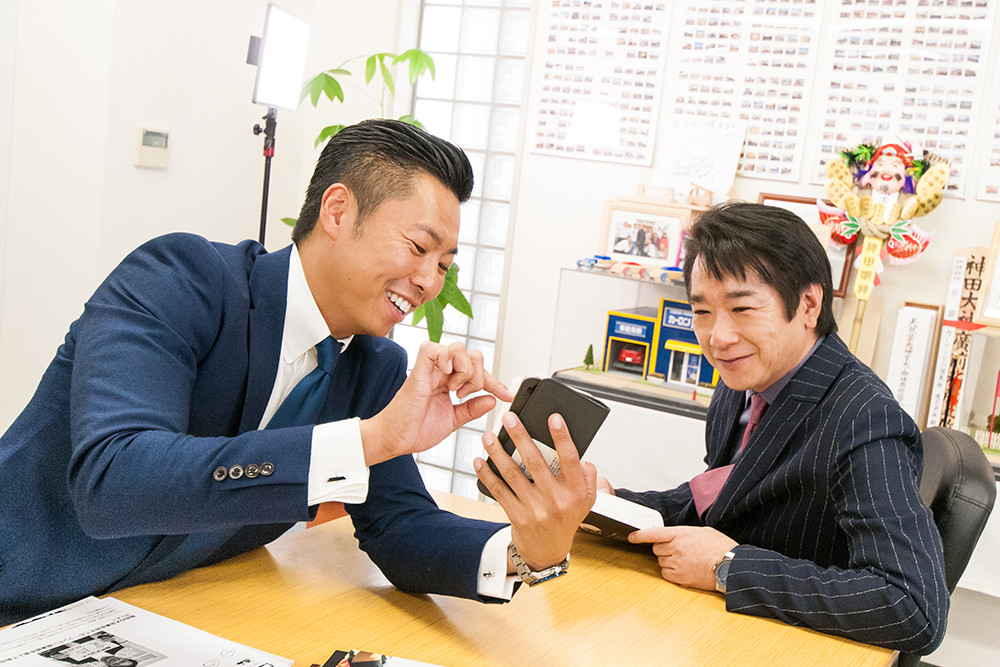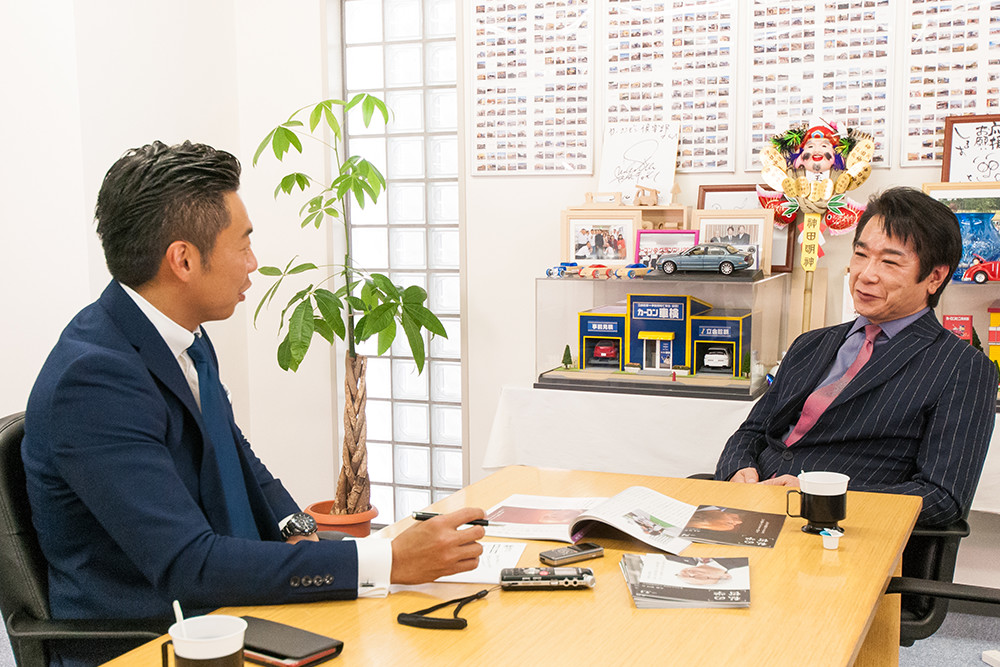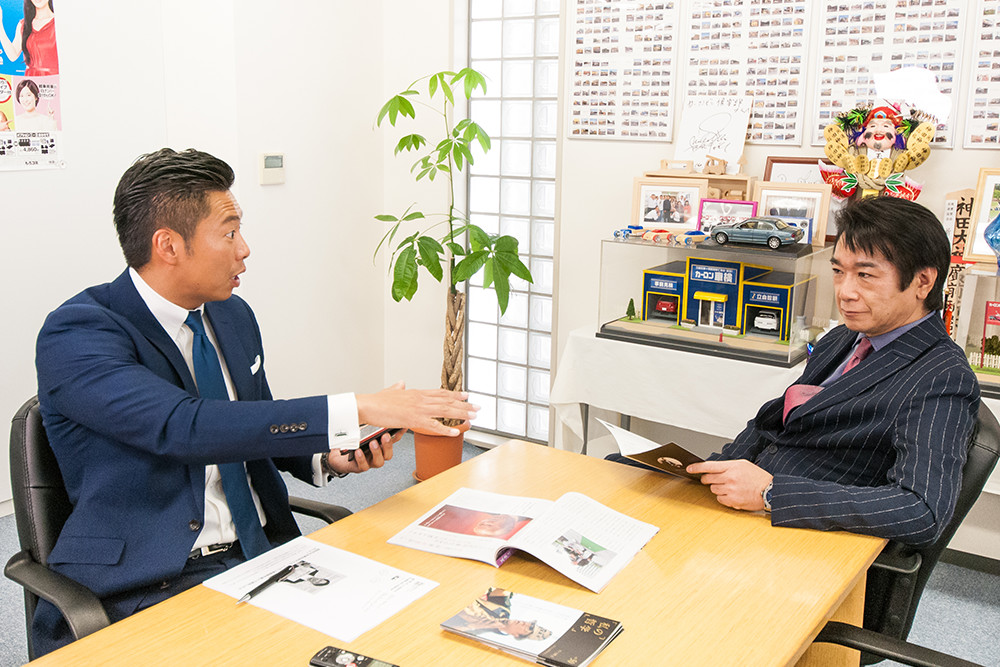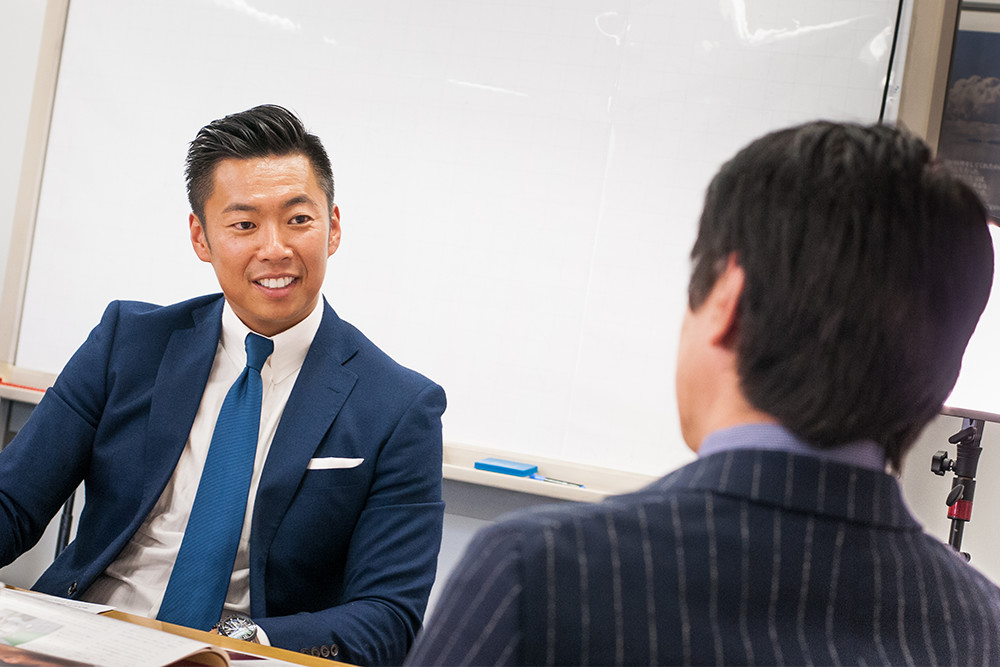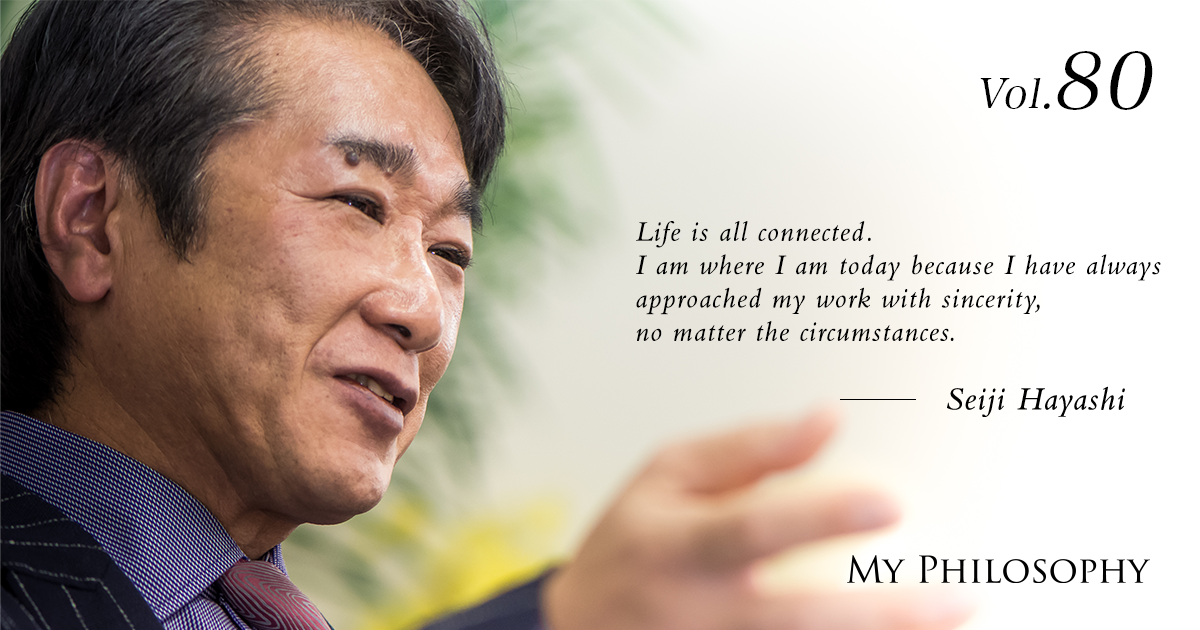
Undeterred by obstacles and without considering personal gain, Seiji Hayashi has always given his all to the work in front of him. We traced the source of his values, rooted in his belief that 'gratitude and duty are important.’
Profile
Vol.80 Seiji Hayashi
President and CEO of Car Conveni Club Co., Ltd.
Born in Hokkaido in 1958, he graduated from the Department of Business Administration at Aoyama Gakuin University. After graduation, he joined Promise Co., Ltd. (now SMBC Consumer Finance Co., Ltd.). In 2005, he was seconded to Sumitomo Mitsui Banking Corporation, where he launched a card loan business, achieving a loan balance of 200 billion yen within three years. In 2008, he returned to Promise and became the youngest executive officer. In January 2011, he acquired all shares of Car Conveni Club Co.,Ltd. and assumed the position of President and CEO. In 2015, he established the joint venture Car Conveni Club Co., Ltd. with a Thai trading company. In 2017, he launched the personal car leasing business 'MoroComi.' He is widely recognized for his management skills, having established new businesses through cross-industry collaborations, and is known for his extensive network of contacts in various industries.
Persevering Without Giving Up
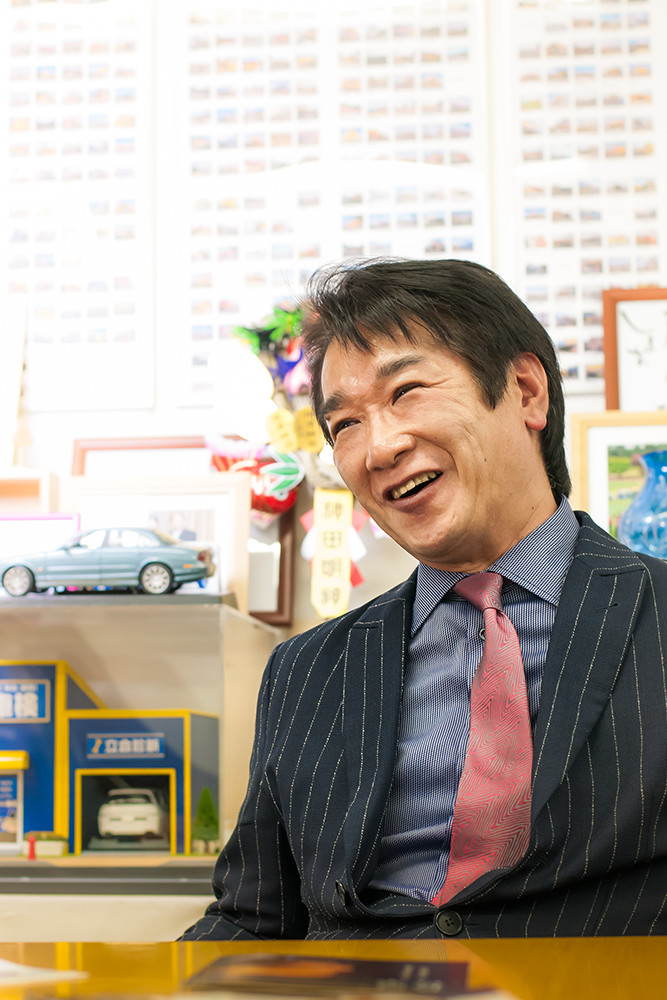
In January 2011, I acquired all the shares of Car Conveni Club. Looking back, I now realize that this was destined 30 or 40 years ago; my entire life up until that point was merely preparation to reach this stage. It all started when I was in my senior year of high school. It was just before summer break. I was suspended from school for smoking, fighting, and other misconduct. At that moment, I thought, “I don’t want to live my life continuing down this path of wrongdoing.” I also felt it would be uncool not to at least get into a university, so I chose Aoyama Gakuin University simply because it was located in Shibuya, and I decided to take the entrance exam. Since staying at home meant my bad friends would come over and tempt me, during summer vacation I went to school every morning at 8 a.m., studied until 7 p.m., then went home, ate dinner, and studied again until after midnight. After summer break, I studied for about 10 hours a day at home, pushing myself to the limit. Many successful people say that ‘perseverance is key.’ I believe the difference between those who succeed and those who don’t lies in whether or not they have the mental strength to keep going without giving up.
I did manage to pass the university entrance exam, but I had studied with the sole purpose of getting in, without any clear goal as to why I was going to university. After entering the workforce, I realized that those four years of university were as important as 10 or 20 years of my life now, and I deeply regretted not making more of that time. That’s why I always approach work by asking myself, “What is my purpose?” and “What are my means?”
As for my job choice, I chose Promise, a consumer finance company that was heavily criticized at the time. My parents and classmates asked, “Why would you join a company like that?” But if I hadn’t joined Promise, I never would have acquired all the shares of Car Conveni Club. That career choice was a major decision that led me to where I am today.
What Ambition Is
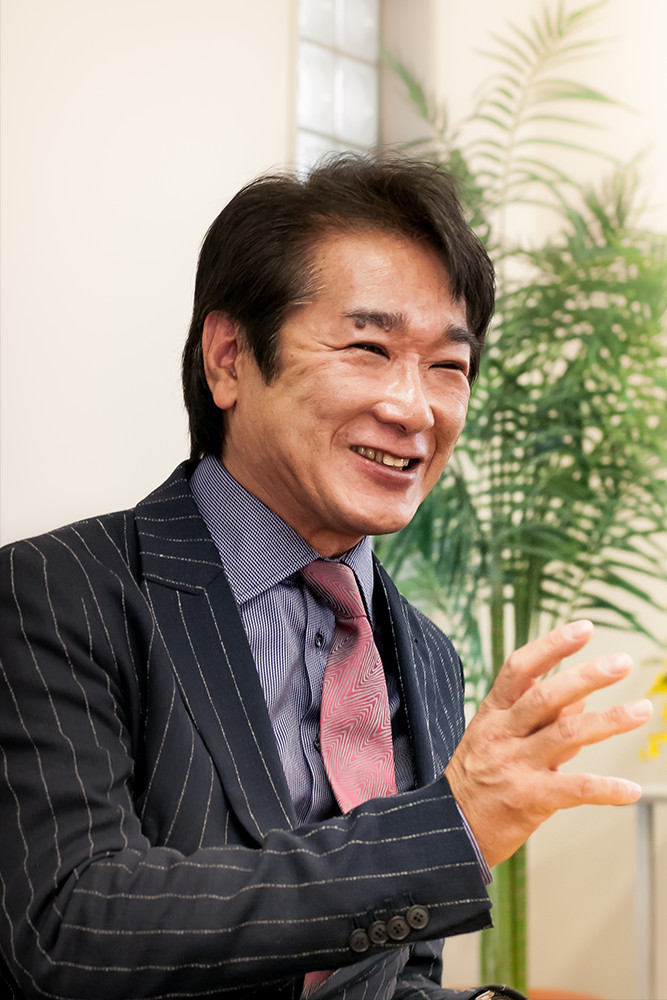
About six months after I graduated from university, the woman I was thinking of marrying told me, “You lack ambition.” It felt like I had been hit with a hammer, and I was so shocked that I couldn’t focus on anything for about a month. After that, I spent around six months agonizing over what ambition really is and what I needed to do to develop it. I audited university classes and spoke with a lawyer acquaintance, trying to find answers. Then one day, I had a dream where God appeared and said, “Let me tell you how to cultivate ambition. Keep these three things in mind as you live your life.”
“The first is to always question things. Acknowledge what you don’t know and make it a habit to always look up what you are unsure about. The second is to foster a sense of rivalry. Set up competitors who are more talented than you and push yourself to compete with them. This will help you develop the will not to lose to yourself. The third is to be humble. People grow by listening to others. But if you don’t have a humble heart, you won’t be able to truly listen to them. Keep an open heart, listen to a wide range of opinions, and grow by allowing yourself to be influenced by them.”
After having this dream, my life changed completely. I realized that as long as I was receiving a salary, I had to work sincerely. I began to feel gratitude toward my colleagues and subordinates, and I developed my personal core belief that ‘gratitude and duty are important.'”
Trapped by Success
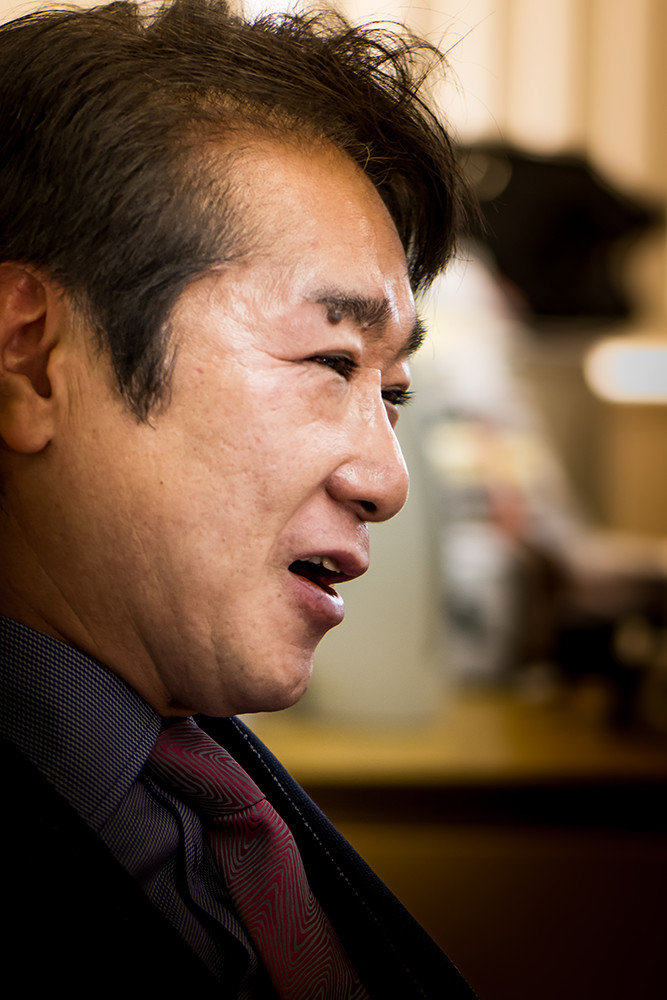
Thanks to the “divine message from my dream,” I was able to rise through the ranks faster than other employees. From an outsider’s perspective, it may have looked like smooth sailing, but since I inherently dislike going along with the flow, I repeatedly experienced both demotions and promotions due to various conflicts. At the age of 45, I was assigned to a three-year secondment at Sumitomo Mitsui Banking Corporation. My responsibility was to launch the card loan business and achieve a loan balance of 200 billion yen within three years. This assignment would later play a significant role in my acquisition of all the shares.
When I returned to Promise, I became the youngest executive officer responsible for the metropolitan branch offices. I turned around the previously negative performance within three months. Probably out of jealousy, the inspection department and other branches conspired and falsely accused me of manipulating figures to turn the performance positive, claiming that 30-some branch managers and about 60 employees had committed fraud. I asked, “If I resign as an executive, will the employees not be punished?” When they said they wouldn’t be punished, I resigned and was transferred to Car Conveni Club, a Promise subsidiary. Had I not prioritized protecting my subordinates over self-preservation, this transfer would never have happened.
Car Conveni Club was running at a deficit of about 10 billion yen. The system in place made it so that the deeper the deficit, the more the executives and others would profit. I cut off all those financial flows, but within 10 months, I was suddenly dismissed. Afterward, I was transferred to various subsidiaries one after another, and eventually, I had enough and left the company. Around the same time, Sumitomo Mitsui Banking Corporation announced it would fully acquire Promise and sell off Car Conveni Club, a non-financial business, through a competitive auction.
I raised my hand because many employees who had cooperated with me were at risk of being laid off, and the franchisees had supported me, saying, “Since you came, this company has become decent. We want you back.”
Past Actions Save You in a Crisis
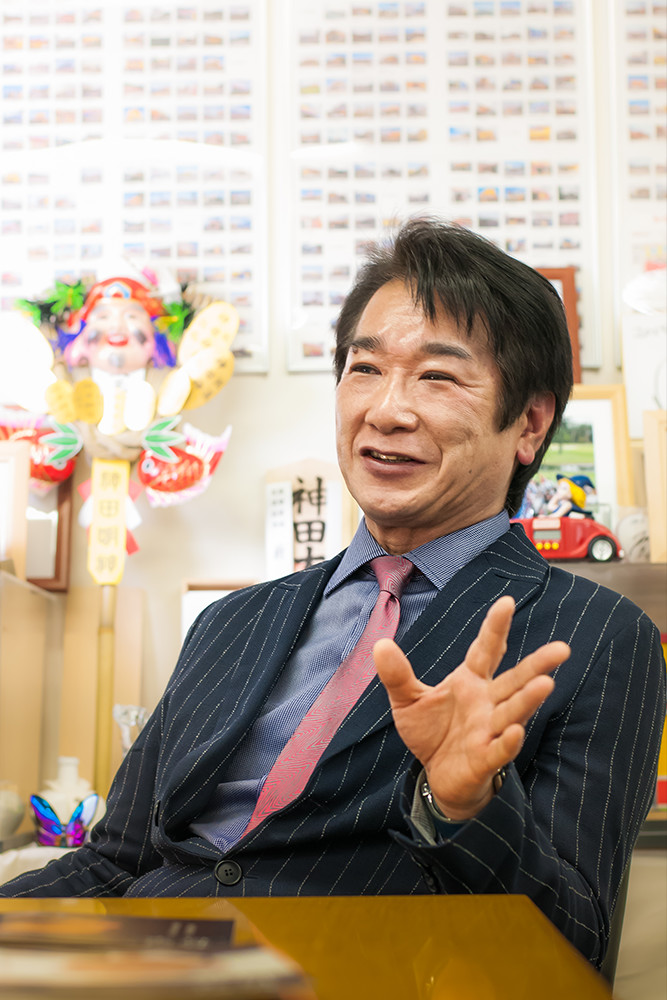
Several prominent Japanese companies put their hands up, but I was the only individual bidding. Since I was fully aware of the company’s financial situation, I estimated that I could buy it for around 300 to 500 million yen. I left the financial arrangements to an entrepreneurial acquaintance who assured me he could secure 500 million yen, while I fought hard to gain the first right of negotiation. In the end, it was a head-to-head battle with a large trading company. This is where my previous secondment experience paid off. The deciding factor was the immense trust I had earned from Sumitomo Mitsui Banking Corporation, Promise’s parent company. The department I had built was generating 20 billion yen in profit annually at that time, so they chose me as the buyer.
I secured the first right of negotiation on December 10, 2010, and the payment deadline was January 14 of the following year. However, the acquaintance who had promised to secure 500 million yen seemingly didn’t expect us to beat a major trading company and suddenly became unreachable. On the Friday before the payment deadline, I went to apologize to Promise, saying, “I’ll have the money ready by Monday. Please just wait three more days.” As I was racking my brain on how to raise the funds, I remembered something. When I was at Car Conveni Club, I had been working to replace an expensive estimation system that was burdening franchise owners with a more affordable and higher-performance one. However, I was accused of proceeding with this important project without proper authorization, which was one of the reasons for my dismissal. In the end, the system wasn’t implemented. When I went to inform the chairman of the system company about my dismissal, he said, “If you ever find yourself in trouble, be sure to come see me.”
So on Sunday, I went to visit the chairman at his house. As soon as I started with, “This is about that promise from two years ago…” he replied, “I’m glad you finally came.” The very next Monday, he held an emergency board meeting and generously provided 300 million yen as unsecured funding.
The Way You Live Is Reflected in Your Work
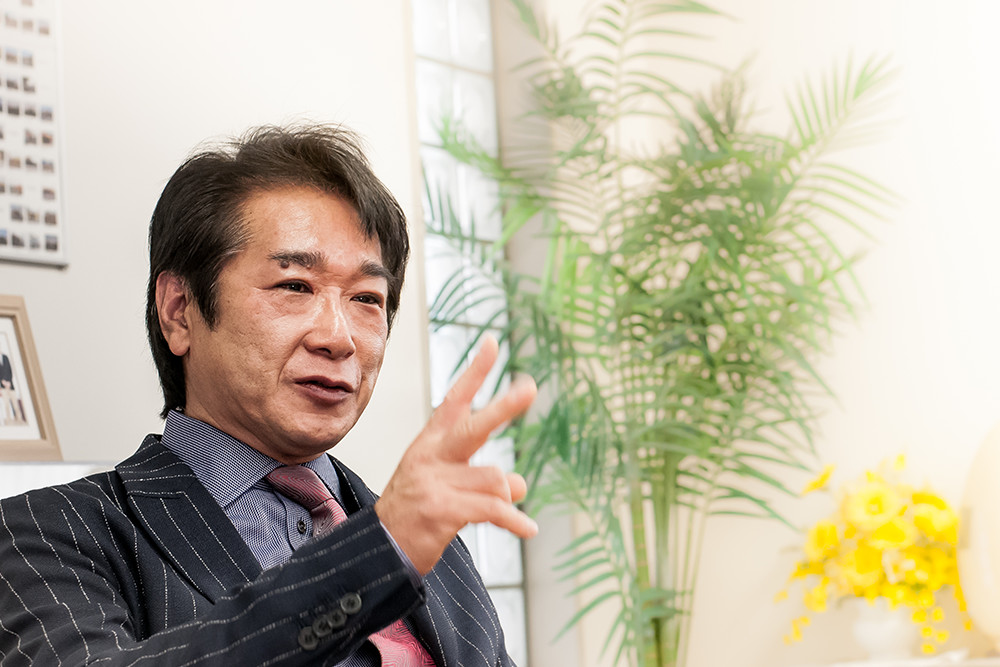
At both Sumitomo Mitsui Banking Corporation and Car Conveni Club, I worked as if my life depended on it, for the sake of the company and its employees. Though this led to my dismissal, had I not been dismissed, I wouldn’t have been able to buy all the shares. It was because I stuck to my way of life—”giving my all in the moment”—that I was able to accomplish what I did. If I hadn’t always faced my work sincerely, I wouldn’t have secured the 300 million yen investment. Every single event has played a role in shaping the course of my life afterward.
It’s precisely during difficult times that the way you’ve lived your life comes into play. When it comes down to it, a man’s way of life is tied to the way he works. By improving the way you work, your way of life improves as well. During the latter half of my corporate career, there were many times I thought that if I stuck to my way of life, I would suffer great losses or lose my position within the company. But I didn’t care. That’s why I’m where I am today. If I had ever done something that went against my own principles, I wouldn’t be in this position. Everything is connected.
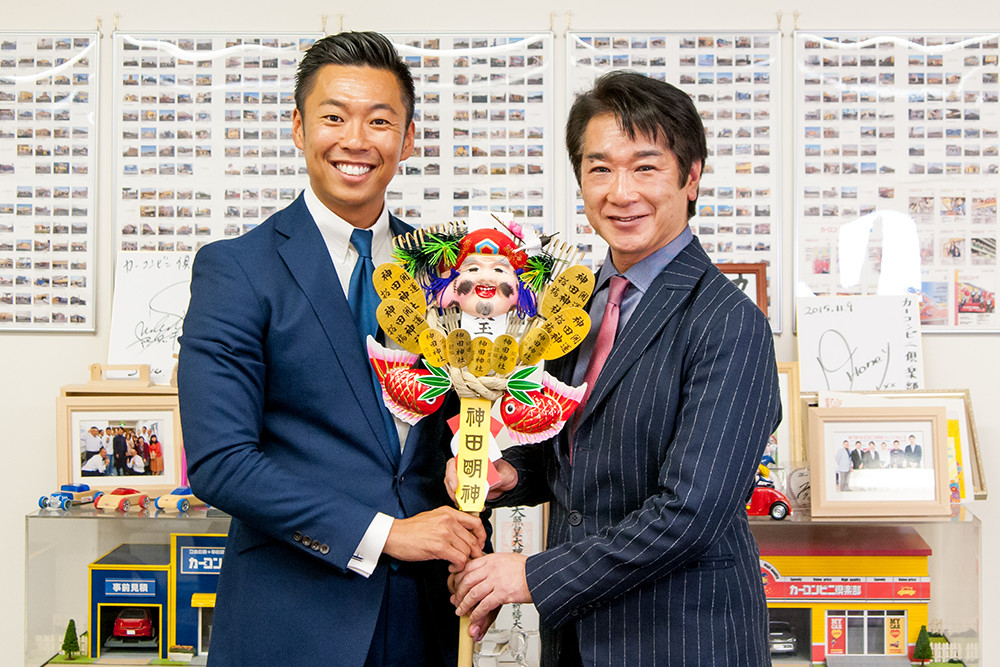
As someone whose job involves giving lectures, engaging in discussions, and talking with franchise owners about management and life, I believe that speaking is my most important role. My conversation with DK Sugiyama was brief, but it was fast-paced and, thanks to his open personality, I ended up sharing parts of my life story that I usually don’t talk about. It was a rare moment where I truly felt the weight of words again.
In this modern age, it’s easy to fall into the illusion that everything can be done via email or social media. However, through my conversation with Mr. Sugiyama, I was reminded of the importance of truly facing people, and I’d like to share this realization with all the readers. Life is about words, management is about conversation, and it is the ‘live’ words that build trust.
Seiji Hayashi,President and CEO of Car Conveni Club Co.,Ltd.
Seiji Hayashi’s interview unfolded like a dramatic movie, reaching its peak midway, leading to a passionate handshake between us. The story of how he was told he was “a man without ambition” and subsequently awakened deeply resonated with me. “Ambition” and “hunger” are driving forces that push one to take action. His remarkable luck came from his unwavering commitment to doing what is right. Whether it was studying or working, he approached both with sincerity and dedication, regardless of whether anyone was watching or not.
This interview reaffirmed for me that a serious, one-on-one conversation is truly the greatest learning experience.
April 2018, Car Conveni Club Co.,Ltd.Translated by ILI Inc.




